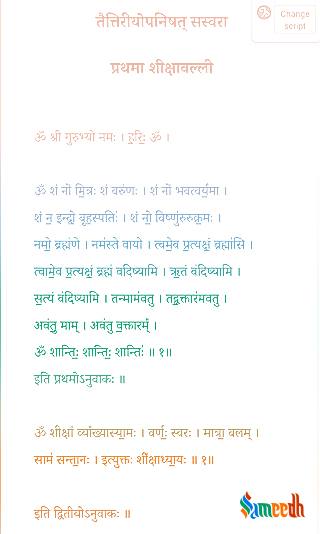The Taittiriya Upanishad explains the virtues required in life to attain the ultimate knowledge and experience eternal bliss. Many of today’s popular Sanskrit shloka are traced back to this Upanishad.

Taittiriya Upanishad, 1.1 to 1.2 verses, Krishna Yajur Veda
What is Upanishad?
Upanishad is the scriptures that connect the knowledge given in the four Ved to common people’s lives and traditions. They are called Upanishad (sitting down closely) because Upa means ‘near’ and Shad means ‘to sit’. Many of the Upanishads are written in the style of a conversation between a Guru and a Shishya sitting near the feet of the teacher. Upanishad are aimed at bringing prosperity, enlightenment, and most to the common people’s lives. Every Upanishad is focused on the knowledge covered in one particular Veda from Rigveda, Samaveda, Shukla Yajurveda, Krishna Yajurveda, and Atharvaveda.
The conflict between Vaishampayan and Yajnyavalkya
Vaishampayan was a scholar who also taught the Vedic scriptures to young students in ancient times. The legends say that once Guru Vaishampayan was feeling guilty about not being able to fulfil his social obligation because of personal priorities, he ordered his students to work towards his atonement. Sage Yajnyavalkya was one of his students. And when other students obeyed his order, Sage Yajnyavalkya opposed it and asked Guru Vaishampayan to seek atonement himself. Enraged, Guru Vaishampayan ordered Sage Yanjyavalkya to vomit out whatever knowledge he had given him.
That was the knowledge of Krishna Yajurved (Black Yajurved) or even Taittiriya Yajurved. The other students around him collected that knowledge – albeit in bits and pieces. Sage Yajnyavalkya then left the ashram to seek absolute knowledge. When he achieved that from Sun, it was called Shukla Yajurved (White Yajurved).
The Taittiriya Upanishad is associated with the teachings of Black Yajurveda.
The Legacy of Taittiriya Upanishad
There are two narratives regarding the establishment of the name ‘Taittiri’. It is believed to have come up from a popular sage ‘Taittiri’. And it is also believed that the students who took up the knowledge vomited out by Sage Yajnyavalkya; did so with the attitude of a Taittiri (Partridge Bird). That’s why it is called Taittiriya Upanishad.
The Taittiriya Upanishad is usually considered to be an unorganized scripture because the verses are arranged in a manner that – the verses in their own capacity seem meaningful but on an broader level, it didn’t create a comprehensive understanding.
They say that Yajurveda was originally created by Ved Vyas. Its knowledge was conveyed to Guru – Vaishampayan who was his student. And Guru Vaishampayan used to teach it to the pupils.
The Knowledge of Taittiriya Upanishad
The Taittiriya Upanishad is divided into 3 major parts – Shiksha Valli, Brahmananda Valli, and Bhrigu Valli. These three are the 7th, 8th, and 9th chapters of Taittiriya Araṇyak.
Shiksha Valli: It is about a virtuous life, and it aims at building a noble character and doing the right karma to be prepared to achieve the Brahma Gyan (Absolute Knowledge). The word Shiksha itself means knowledge or education.
Brahmanand Valli: It is about the theory of the creation of life and the bliss of being one with Brahman. It depicts the approach of ‘learning the right and unlearning the wrong’ as the way to experience Brahmanand which means eternal bliss.
Bhrigu Valli: It is about giving an example in the storytelling format so that one can understand chapter 2 faster. The story of Bhrigu Rishi is narrated to explain the relationship between Brahman and Atman